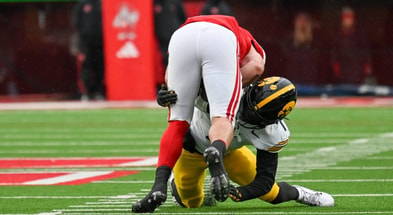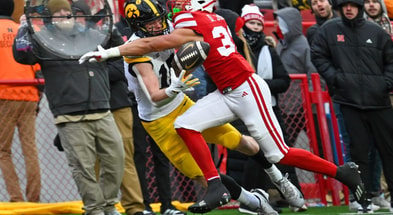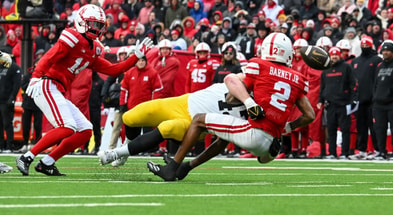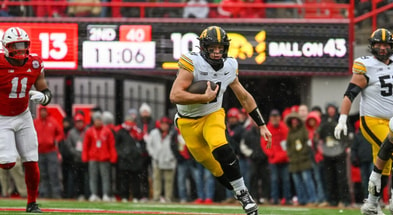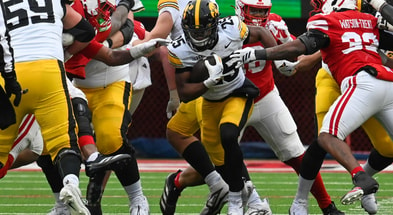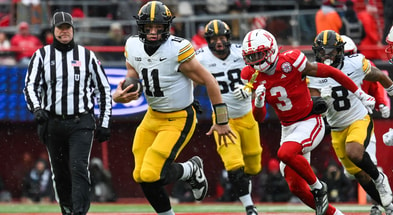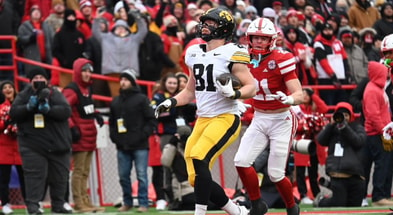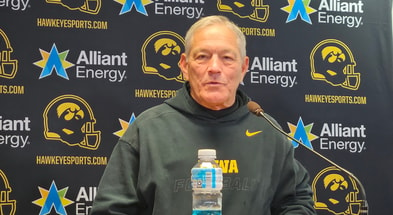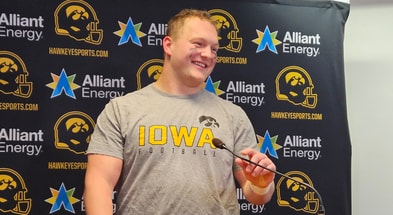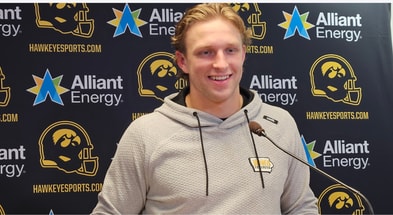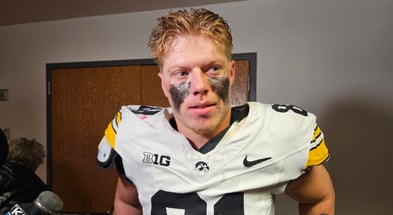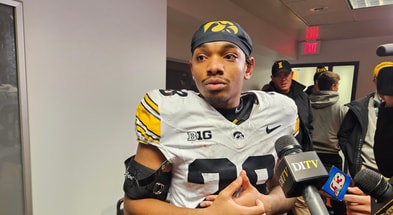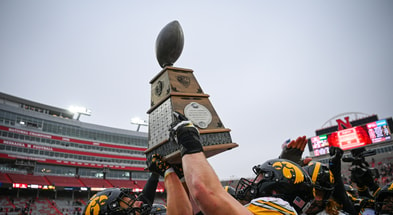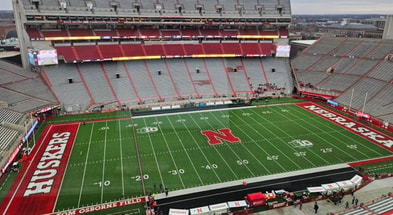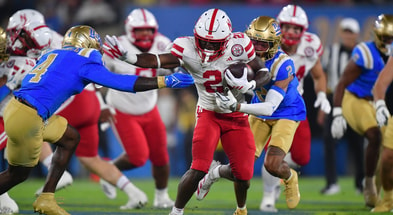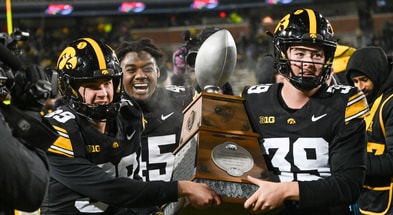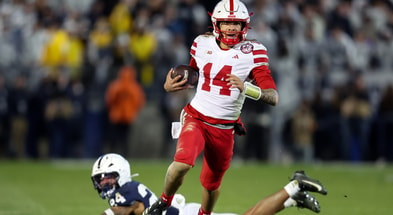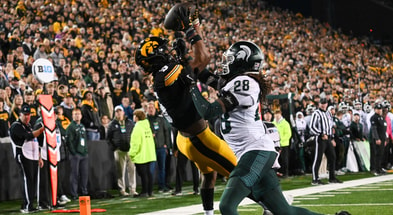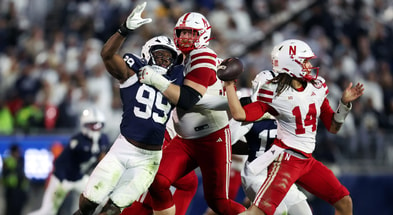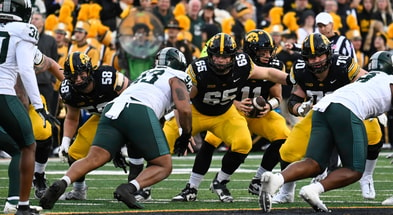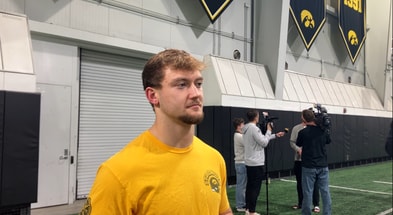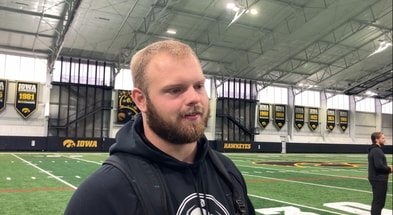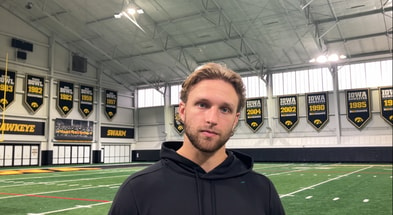Kirk Ferentz talks new coordinator and hiring process
For the first time since the bowl game, Kirk Ferentz met with the media in Iowa City. The Hawkeye head coach had a couple of topics front of mind. The first was the hiring of Tim Lester as his offensive coordinator, but the other was also a staff change and the elevation of Seth Wallace to assistant head coach. Ferentz went into detail about both staffing moves and the future of the Iowa offense.
KIRK FERENTZ OPENING STATEMENT
Really excited about this team, working with this team. We got back here almost four weeks ago Wednesday.
But really like the group that we have. Certainly excited about the way the staff is coming together. We still have one spot to fill, and hopefully get that done in the next two weeks. We have a good grip on that as we move forward.
It’s like every year at this time, it’s all about moving forward. It’s a new team, new year, new opportunities, and the biggest thing is we just have I think great people involved in the program at all levels, and really pleased with the success that we’ve experienced, and I kind of go with five-year increments, and certainly the last five years with three 10-win seasons, a lot to be proud of there, and we know there’s a lot of work in front of us, and that’s the fun part. It’s great to be off the road.
Got the bowl game concluded, get back here, and you turn your attention to working on the staff and then also starting to think about the things we need to be doing going forward and also recruiting, so it’s great to be back on campus. It’s always ironic our players get here and we all leave and go recruiting. Kind of funny how the calendar works.
The best part is in front of us right now. It’s when the work gets done, getting a chance to get reconnected with our players, getting to know them better, what their needs are, how we can try to move them forward, and then transition into spring practice at some point.
But each and every day has got purpose, it’s got importance, and this to me is a really fun time when you’re on campus with your players, with your staff, and able to work with them.
Q. I wanted to ask you about the offenses that Tim has put together, relies heavily on RPO and 11 personnel. Iowa does do a lot of 11 personnel, but also kind of a foundation that’s more under center. How do you anticipate kind of the marriage going, and what are kind of the keys that you think will help the RPO game work here at Iowa with what you have?
KIRK FERENTZ: It’s kind of funny, my first blush was crossover film through the years. You can watch people, and the first thing I think of is 12 personnel with them. They ran the ball extremely well. To that point, what you said is correct, as well.
That’s the key component here. He has a real diverse background. He’s experienced in a lot of different areas, as were many of the candidates, and that’s attractive.
Last year being in Green Bay, being on the defensive side, yet part of his response, and I don’t want to speak for him, but part of his job was to analyze the offense that Green Bay would face each and every week, so forget about the preseason, but got to study 17 games and two playoff games.
It’s like a year of research, and I’ve always joked about it would be great to have a sabbatical like professors and go research, study. The bad news is it usually means you got fired the year before when you get to do that in our business, but it was a wonderful opportunity to just put it to good use.
Long story short, he has a real extensive knowledge of offensive football, and then the most important thing in any year is knowing who your players are, where their strengths and weaknesses are, and then trying to get them in the right spot, and that came across clear during the conversation portion of things over time. This offense is all about figuring out who we’ve got to get the ball to and then working from there, and hopefully we’ll have a couple people to get the ball to, not just one or two.
Q. I’m sure as you studied Tim’s background at Syracuse, Western Michigan, even the Packers, I’m curious where you landed in terms of where his potential was offensively and what you liked about his track record at all his stops.
KIRK FERENTZ: I think I’d look more at the last six, seven, eight years probably, Purdue on. With all due respect to Syracuse at that time, because I don’t read a lot of feedback, but I did read somebody took a shot at that one.
My first thought was okay, if you evaluated my career at Maine, I probably still wouldn’t be standing here. I never would have been standing here. We were 12-21 at Maine.
You can go back, and I think you have to quantify and qualify everything you look at.
It’s like our team last year, I think there are pretty obvious reasons why we struggled offensively. It doesn’t take a detective to figure that out.
What I’ve looked at and focused more so, the job he did with David Blough at Purdue and then the entire body of work at Western Michigan. You consider the MAC schools, they typically play at least two games that you’re fighting, swimming uphill, upstream, and look at some of the wins that they had and some things they did, beating Pitt in ’21, there’s some really impressive things there, but more it’s about the big picture.
Then last year’s experiences really factored in, too. You try to examine the entire resume, try to talk to a lot of people that have worked with him and know him pretty intimately, and then project is this candidate going to be a good fit.
Felt really good about it, the work I did on the front end, and then certainly with our staff getting involved.
Everybody gets involved in the interview process, making phone calls, all that type of thing, so it’s pretty thorough, pretty extensive.
Because of that, I feel really good about where we’re at.
Q. I wanted to ask you about the wide receiver position. Do you remember when Greg Davis got hired, he brought Bobby Kennedy in with him; is that something you would consider doing with Tim, or have you maybe settled or do you have a direction where you’re going right now?
KIRK FERENTZ: I think we’re on a good path, but there’s no mystery. The position is not the same but it is the same in that it’s a fresh beginning for everybody right now. We’re fairly young in that room in a lot of ways, and we’re fairly inexperienced in terms of production, that type of thing. But there’s a lot of potential there.
Ultimately you want to get somebody who can, just like Tim said a minute ago, build relationships, be good teachers, and most importantly, a coach’s job is to help players become better. If it was pro football, it would be all about becoming better players. College football, there’s a lot more to it, seeing the big picture, student, character, citizenship, all those types of things, as well as being good players.
But I’ve given a lot of thought to the guys in the room. I think we have good potential right now, and really it’s about moving those guys forward, seeing the potential.
Also getting them to see the potential, I think that’s probably the most important thing right now.
Q. When you got to the point of the interview process where you were interacting with Tim on a face-to-face more kind of personal basis, what struck you and made you feel like that relationship could be one that could work really well?
KIRK FERENTZ: It’s kind of interesting. Tim’s situation is a little bit unique, but there were a couple, three, maybe four people that worked with him that I really trust and value their opinions, and I know a couple of them have personal connections to this program. One person in particular, we have a past relationship. He was a player a long time ago for me that worked with him — so when you talk to those people and they know what we’re about and they know what he’s about, it’s reassuring because a huge part of anything we do — we all spend more time with each other than we do with our wives and families.
The first thing is you want to bring somebody in the building who is not going to be like everybody else but who is going to share some common goals and realize this thing is bigger than any one of us individually.
That came across real clearly.
Then when you get into the personal part of it and the personal interaction, the staff interaction, then hopefully that comes across to everybody and everybody feels the same way, and I think, again, I feel really good about how our staff felt about Tim and their exposure to him and the things they learned, too, when they did their homework and research. But this was a group effort for everybody.
To be involved I think is important, and for everybody to — maybe not be unanimous on the vote necessarily but everybody saying, yeah, could really see this guy being really successful with us and then letting him go to work.
Top 10
- 1Breaking
Mark Stoops
UK coach emphatic on future
- 2New
Guarding the M
Michigan players stay on field
- 3
Jon Sumrall
Latest on Tulane coach's future
- 4Trending
Michigan headbutt
Jaishawn Barham hits ref
- 5
CGD Picks
Rivalry week is here!
Get the Daily On3 Newsletter in your inbox every morning
By clicking "Subscribe to Newsletter", I agree to On3's Privacy Notice, Terms, and use of my personal information described therein.
Q. Going to Seth as assistant head coach, is there anything he can take off your plate or anything he can do now that he has this new role?
KIRK FERENTZ: Yeah, this is the first time we’ve done this, so I’m not sure what it’s going to look like quite frankly. If I weren’t able to be here for some reason, and there was a practice back during bowl prep where I had to attend a funeral, I wanted to attend a funeral, and it just worked out where I actually made it back 10 minutes beforehand, but in a circumstance like that, I’m not in the office for whatever reason, certainly somebody has got to kind of say yes, no or here’s what we’re doing.
There might be some things as we go down the road here a little bit that maybe I can do a better job in terms of delegating, taking some things off. He’s not the only guy on the staff, but I’ve got to have total trust that whatever he does is probably going to be better than what I would do, so probably can learn a lesson right there; try to take that to task.
Q. In the RPO game there’s a lot more slants that are involved and probably more slants than you guys have run recently. Do you look at that as a positive for this offense and getting the ball out of the quarterback’s hands at a mesh point, and how can that help elevate moving the ball down the field and the way you want it to be moved?
KIRK FERENTZ: Yeah, it’s not something we haven’t ever considered or we’re blind to. It’s kind of like I touched on earlier, part of Tim’s job is going to be to figure out what do we want to emphasize. You can only practice so many things and emphasize so many things and do them well. But if that’s something we deem to be good for our offense and fits in the package and we can execute it and not take away from other things, it’s a balancing act a lot of times. But yeah, I’m open to anything right now, any ideas.
The whole idea is advance the ball and help yourself, and hopefully in theory there you’re helping yourself in the running game. You’re also helping yourself in the passing game. It starts with not having a negative yardage play. That’s the first way to kill an offense, besides turnovers. That’s the worst.
I think one thing I would interject, with his head coaching experience, it came across, and that wasn’t a requisite, but it’s certainly a plus in my mind because if you’re paying attention, you really have an appreciation for how football is complementary and how one thing affects the other. We’ve been pretty good on defense. Obviously we want to be better offensively, and we have been better. We want to get back to that.
But just how one thing affects the other. You’ve got to be really sensitive to that because as much as things change in football, and I know entertainment value is a big thing in this day and age, but it’s still about winning, and that’s really where my focus was 25 years ago, and it’s going to stay there. That’s what we’re trying to do is win games if we’re going to keep score, which I’m pretty sure — someday we’ll play without equipment, I’m convinced of that, but they’ll probably still keep score.
God only knows, I don’t watch that Pro Bowl stuff, whatever it was on Sunday, but I can tell you this: I have watched it when they did have pads, and they’ve done what they’ve done because that was ridiculous when they had pads. That was just a waste of everybody’s time.
And good reason; I wouldn’t have done that, either, if I was one of those guys.
Q. You were quoted in the past as kind of downplaying the total offense stat. I believe you were quoted in the Big Ten Network as saying it was the most overrated stat in football. Do you stand by that? I noticed in the press release about Tim’s hiring that his numbers at Western Michigan specifically in total offense were cited. Do you still believe that’s a stat —
KIRK FERENTZ: Is that in the context of making this hire? Is that for clarification, me talking about total offense?
Q. As far as goals and criteria for evaluating Tim’s performance.
KIRK FERENTZ: Yeah, I’ll give you what I was referring to specifically and then I’m going to step aside and let everybody else talk. But basically my reference is it’s an interesting — believe it or not, I do pay attention to what goes on nationally, and I’ve kind of been fascinated through my career. There’s certain guys that get reputations. In fact, I worked with one 26 years ago. Do the math here, 26, 27 years ago — no, holy smokes, 35 years ago, okay. It was a guy who it was all about him and it was all about the next job, so it was all about his numbers, and the place I was at had a pretty prolific quarterback. In fact, we actually had two really good ones, but it was all about what he was trying to do, his agenda.
Over my career, I’ve noticed there are certain people — I’m not saying that’s all they’re thinking about, but it’s more about their portion of the equation, if you will. I really don’t gravitate towards people like that.
I’m kind of fascinated — I am a little petty; sometimes I’ll do a little research, and that’s where the wins per game stat came from. So it’s possible for a guy to really try to emphasize what it is he does, make himself look pretty good. Meanwhile, the team is winning seven, eight games, which I’m not making fun of that by any stretch. Every game to win is tough.
But when that starts taking away from what the team might be able to do, I really am not interested. I have no interest. I’ve just never gravitated towards that type of person, I guess.
I’m just not big into self-promotion, not big into look at me guys. Sometimes those guys are really good, and the coach does deserve credit. I’m all for that. There’s a reason why things happen typically.
But I think, again, it gets back to what’s the bigger picture. Are we trying to be a showy offensive team or a high-blitz team or whatever, and that stuff is all great until you’re giving up the big play, or on offense you turning it over to the other team and all of a sudden your defense is out there defending 20 yards.
Everything goes together, I guess, and I’ve just never been fascinated with that glitzy stuff sometimes that a lot of people get distracted by.
We’re just trying to build a team. We’re trying to build a team on the field that’s going to be able to get the job done and hopefully at the end of the game win, and fortunately we’ve been on the right side of that more than not, so try to stay there and try to improve on that. That’s our goal.
Offense is a big part of that. That’s our goal. I’m not minimizing that. If we can hold them to 500 yards and hold them to 150, awesome, unless we’re getting six punts blocked. There’s something everywhere.
